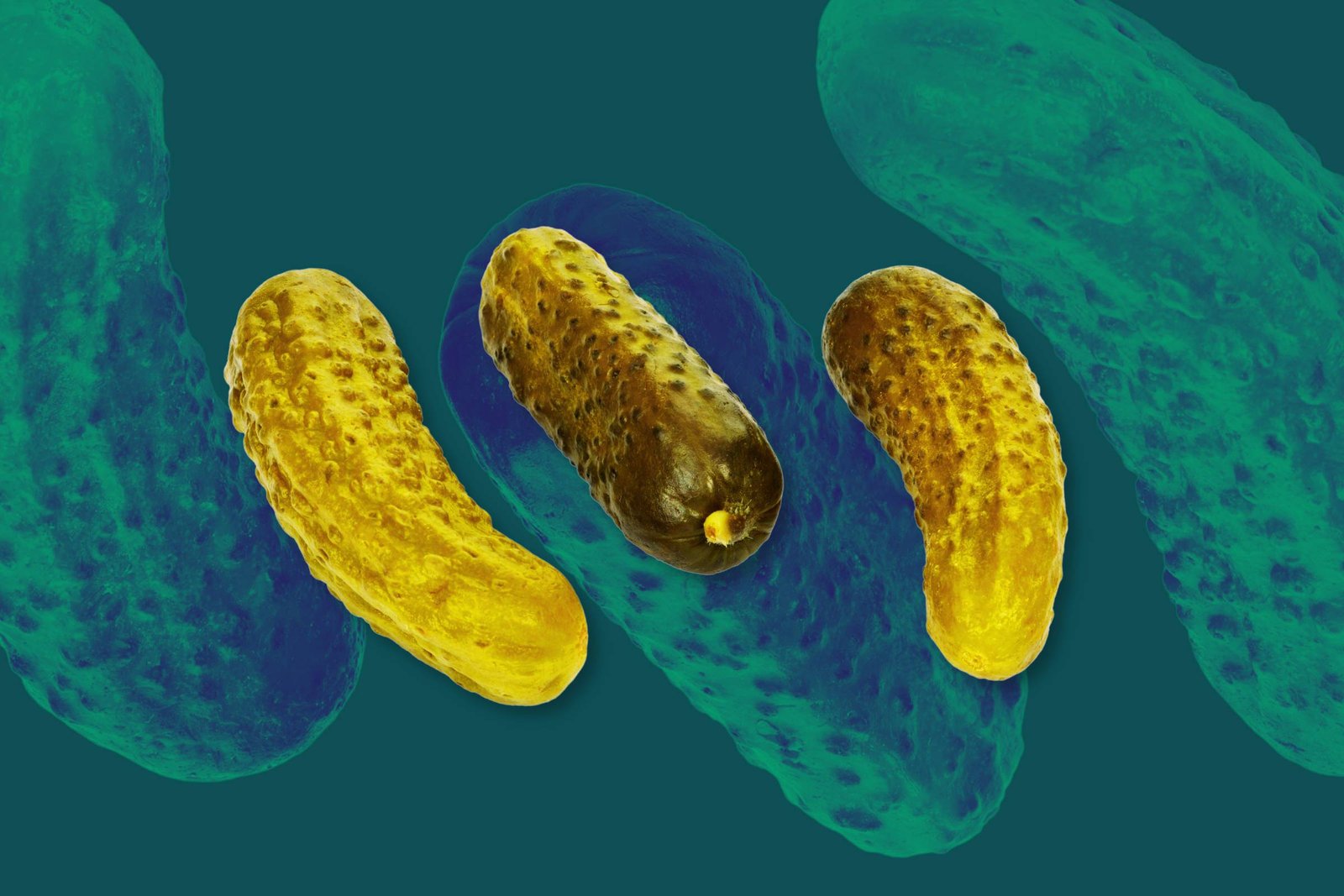
[[{“value”:”
Maybe you heard somewhere that pickles are a “superfood,” and dutifully added them to your shopping list. Unfortunately, you may reach for the wrong jar, because many pickles at supermarkets aren’t especially good for you.
Scientists have made progress in separating fact from fiction when it comes to health claims about pickles: both the cucumber kind, and other types of pickled vegetables. We asked experts how to find the healthiest kinds of pickles, which benefits are backed by research, and the right amount to eat every day.
[time-brightcove not-tgx=”true”]
Pick the best pickle
Most of what you find at the grocery store—in both the refrigerated and room-temperature sections—are “quick pickles,” meaning the cucumbers (or other pickled vegetables) are acidified in a vinegar-based broth for no more than a few days. Some of these quick pickles are also heat-processed to make them last longer on store shelves and destroy pathogens that could make people sick.
This process is called “pickling.” But what you really want are fermented pickles.
During fermentation, the vegetables sit in a salt brine for several weeks. This leaves enough time for healthy bacteria, or microbes, living on the cucumber’s surface to act on the sugars inside the vegetable, converting them to lactic acid. The process gives pickles their tangy flavor while killing off other bacteria that could spoil them or harm you. And when you eat these fermented treats, scientists think the remaining live microbes affect the gut in ways that improve health.
To find these healthier pickles, look for refrigerated jars with labels that say “fermented.” In addition, the ingredients list on the back generally should not include vinegar, which is a sign of quick-pickling, says Robert Hutkins, a microbiologist at the University of Nebraska. (There are, however, a few brands of “lightly” fermented vegetables that do contain some vinegar, he adds.)
Read More: Is Kombucha Healthy? Here’s What Experts Say
Another telltale sign: “When you pop open a jar of fermented pickles, you should see some bubbles forming on the surface,” says Frances Largeman-Roth, a registered dietary nutritionist and author of Everyday Snack Tray. Some examples of fermented pickles include several Bubbies products (the ones marked “fermented”) and Olive My Pickle.
Adopt a pro-microbe mindset
If eating microbes sounds unappetizing, keep in mind they’ve been part of the human diet for eons. People were enjoying fermented vegetables more than 4,000 years ago, according to anthropologists. Other evidence shows that our earliest ancestors discovered the tastiness of pickled veggies after stumbling upon vegetables that had been buried underground—by accident, at first—millions of years ago. In Korea, keeping salted vegetables in cold, dark soil developed as a useful way to preserve foods, which had a similar effect as today’s fermentation methods.
Read More: Why Older People Love Pickleball So Much
You’re very unlikely to become ill from eating properly fermented vegetables because the microbes and the use of right techniques will create conditions that make it nearly impossible for pathogens to grow. Large and small manufacturers alike are required to comply with safety regulations.
The health perks of pickles
There is “evidence that fermented vegetables, including pickles, may have health promoting properties,” Hutkins says.
More research is needed, but a few dozen studies have been well designed to compare diets with pickled vegetables to diets with non-pickled versions of the same vegetables, Hutkins says. Most of this research has been conducted in Korea and focuses on kimchi, or pickled cabbage—not pickled cucumbers. But the findings are promising, with fermented vegetables—again, mostly cabbage—linked to significantly better glucose metabolism, lower risk of Type 2 diabetes, a more robust immune system, decreased triglyceride levels, and higher HDL cholesterol (the good kind) in people who ate them.
Other research has found that regularly reaching for fermented veggies is linked to lower blood pressure. “That’s counterintuitive,” Hutkins says, “because these products contain a fair amount of salt,” an excess of which may increase blood pressure. One theory to explain this paradox is that “fermented foods may counter the potential negative effect” of sodium, says Andres Gomez, a microbial ecologist at the University of Minnesota.
Read More: How Stress Affects Your Heart Health
The benefits seem to come partly from the fiber, vitamins, minerals and other chemicals that are retained during the fermentation process. In addition, the live microbes of fermented vegetables may offer unique benefits compared to the unpickled, unfermented kind, providing more support for intestinal and metabolic health. At least one study linked a healthy diet, spiced up by pickles, to reduced psychological stress, supporting the theory that the gut and brain exchange important information. “We know the microbes, organic acids and other metabolites in fermented foods influence communication between the gut and brain in a positive way,” says Gomez, who studies this phenomenon.
Mix up your pickles
Try to add multiple types of pickled vegetables to your diet: cucumbers, cabbage, carrots, peppers—the list goes on. Since different pickled vegetables pack distinct microbes, such a repertoire could be healthier than eating only one kind. This helps explain why kimchi may be particularly good for you. Kimchi recipes typically mix napa cabbage with other pickled ingredients, such as bok choy, green onions, garlic and ginger, multiplying the microbes headed for the gut.
Such diversity is “considered one of the most protective and healthiest approaches,” Hutkins says, adding that we’ll need more studies to know if it makes a large difference to a person’s overall health.
Pickles vs. pills
Probiotic supplements often contain microbes like the ones found in fermented vegetables. So, if you’re looking to benefit from these microbes, you could replace pickles with pills—at least in theory.
Read More: What the Science Says About the Health Benefits of Vitamins and Supplements
However, “not all probiotic supplements have been verified to work,” Largeman-Roth notes—plus, pickles are less expensive and taste better. “Personally, I prefer to get my nutrients, vitamins, and my live microbes from food,” says Hutkins, who founded and advises a probiotics supplement company called Synbiotic Health and wrote a book on fermented foods.Many probiotic supplements also lack the chemicals that result from the activities of live microbes during fermentation, Gomez says. Fermented pickles contain these “postbiotic” chemicals, such as butyrate and GABA, which have their own benefits for gut health and gut-brain communication, he says.
The right amount of pickles
Aim to have between two tablespoons and ¾ cup of pickled vegetables per day, Hutkins says. That’s the range eaten in studies showing health benefits. If you load up on more, you could get yourself in a pickle with your doctor. Pickles contain a fairly high amount of sodium per serving, and an overage of sodium is linked to adverse health outcomes.“It’s okay to eat pickles daily if you’re balancing out their sodium content with fresh, low-sodium produce like fruit and leafy greens,” Largeman-Roth advises. This is another reason to buy fermented pickles; the non-fermented, unrefrigerated, quick-pickled brands often have more sodium. Even with fermented pickles, though, it’s important to look for pickles with lower sodium and be mindful of your overall sodium intake.
Get the most from your pickle
To truly raise your pickle game, eat them after you’ve sweated a lot during exercise or a sauna session. In this scenario, the salt content works on your behalf, because it adds electrolytes that were lost through sweating, Largeman-Roth says. So, for a strategic recovery, grab a pickle after pickleball.
“}]]
We asked experts how to find the healthiest kinds of pickles, which benefits are backed by research, and the right amount to eat every day.
Uncategorized, Evergreen, freelance, healthscienceclimate
Health – TIME


